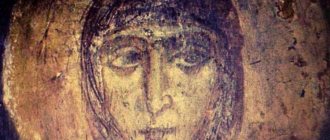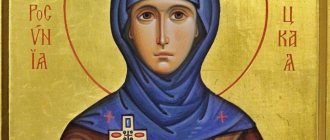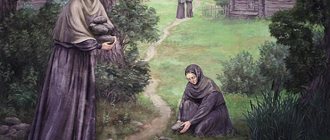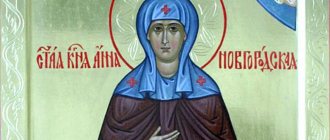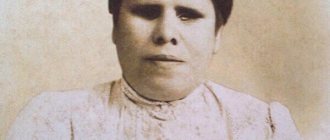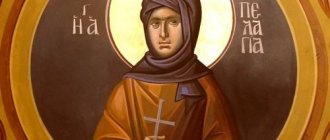About the book
The book “The Ordeal of Blessed Theodora” was written based on the life of the holy Venerable Basil the New, who lived in Constantinople in the 10th century. His detailed life was compiled in the 18th century. Russian saint Dmitry of Rostov. It is part of the four-volume work “Cheti-Minea”, the source of which was the most ancient hagiographic texts.
Book “The Ordeal of Blessed Theodora”
It is possible that the Russian author became acquainted with the text of the first life of Basil of Constantinople, compiled by his student Gregory. Modern books published under this name are collections that consist of the following parts:
- the teaching of the church on ordeals;
- the ordeal of blessed Theodora;
- testimonies of contemporaries who went through ordeals.
Reading these small publications helps Christians find out what awaits them after death, think about the inevitable end of earthly existence, and prepare for confession.
Prayers
Troparion, tone 8
The beauty of Orthodoxy, the stronghold of piety / and the protector of the Church of Christ, / the bright dispensation of sacred icons, / the honorable queen, / to God with your prayers / freedom from the heresies that glorify you, / from above, ever giving permission for sins.
Kontakion, tone 3
Decorated with flowers of piety, O holy one, / and crowned with a diadem from the hand of God, Theodoro, / champion of the whole church, you appeared, / having raised the veneration of the icon of Christ beyond doubt and the saints, / with whom you were identified with the heavenly lot.
The Story of Blessed Theodora
Saint Theodora lived in the Byzantine capital in the 10th century. Ordinary Christians often confuse her with another holy wife who bears the same name. She lived at the end of the 9th century. As the ruler of Byzantium with her young son, she restored the veneration of icons, for which she was glorified by the Christian Church. Blessed Theodora lived her earthly life modestly, but her posthumous gift is priceless for Christians.
Life
Theodora was born in Constantinople. She got married, but the marriage was childless. After the death of her husband, she took monastic vows and became a novice of Basil of Constantinople. The woman led a quiet, pious life, filled with helping needy and sick people. She warmly received travelers, giving them kind words of encouragement. She died as an old woman in her cell in 940, having spent most of her life next to her spiritual father Vasily.
Posthumous miracle
The veneration of Blessed Theodora is based on a posthumous miracle - her appearance to the disciple of St. Basil. Gregory, who knew the pious old woman Theodora, wanted to know where her soul ended up when it left the earthly world.
Icon of the Venerable Theodora of Constantinople
He asked his teacher in prayer to the Lord to ask him to reveal to him the posthumous fate of the nun. The Lord responded to the prayer, and after some time in a dream the young man saw a woman who was in the bright chambers.
Opposite ideas about ordeals
The Orthodox teaching on ordeals is important in the salvation of Christians. In the “Canon for the Exodus of the Soul,” which is read at the bedside of a dying person, there is even the following troparion:
“Aerial prince, rapist, tormentor, champion of terrible paths and vain tester of these words, grant me permission to pass without restraint from the earth” (canto 4).
So one cannot reject the judgment about the reality of ordeals.
However, people who have just acquired faith can go to extremes. In order to avoid air obstacles in the future, during confession they begin to list all possible sins, saying that they have sinned in everything. But to receive forgiveness from God, it is important to be aware of your sins. Only after this is it possible to bring true repentance.
“Repentance is only true when a person, realizing his sins, with which he angered his Creator, leaves the sinful act, regrets and repents, and is worthy of forgiveness by the grace of Christ through the permission of the clergy of the Church. And when he does not leave, although he repents, then this is not repentance, but even a dangerous, excessive and reckless hope in the goodness of God, which, just like despair, is judged in equal measure before God” (Reverend Macarius of Optina, 1788- 1860).
Theodora's story
The bright soul succumbed to George’s persuasion and told her way to the Kingdom of God.
hour of death
While on her deathbed, she saw that she was surrounded by demons that looked like people with black skin, who were screaming and preparing to take her away. The woman was frightened and tried to turn away from them. At this moment, two angels appeared, shining with a bright light.
Orthodoxy about death:
- How not to be afraid of death
- What happens to the soul 40 days after death
- Words of condolences on death
At the sight of them, the demons retreated, but continued to scream about Theodora’s sins. The sides of light and darkness fought for the soul of a Christian, presenting her good and bad deeds. Their dispute was interrupted by Death, who came to free the soul from the mortal body. The old woman again felt strong fear, but after a while she looked at herself from the outside, like at clothes.
Interesting! She was supported by the angels who came for her, and the demons continued to demand that she give it to them. At that moment, Saint Basil appeared and handed the angels a bag filled with treasures that he had earned through hard spiritual work. Seeing the reverend husband, the demons disappeared.
And the spiritual father washed Theodora’s soul with myrrh and oil, which transformed and cleansed her. He asked the angels, after passing all the tests prepared for the soul, to take it to the abode prepared for him by the Heavenly Father. After these words, the Monk Vasily disappeared.
Air ordeals
The angels picked up the bright soul and carried it across the heavenly world to the east. On this path, air spirits were already waiting for them, in whose hands were scrolls describing the sins committed by Theodora during her life. In total, there are 20 publicans on this path, accusing the soul of the following sins:
- Celebration. Demons accuse souls of uttering curses and curses, flattering and useless speeches. The air spirits rejoiced that Theodora committed similar sins in her youth and forgot about them. But the angels countered these sins with good deeds and part of the treasures of St. Basil, and the demons had to let them pass.
- Lie. Publicans talked about cases of uttering false words and hiding their sins in the sacrament of confession. The heavenly defenders spoke of good deeds, and again resorted to the help of Father Vasily’s treasures.
- Condemnation and slander. Saint Theodora did not condemn or blame people. But the demons blamed her for approving the condemning speeches of other people. The angels paid off their accusers with treasures and continued on their way.
- Gluttony. Spirits are accused of participating in feasts, of excessive consumption of food and drink, and of meals that did not begin with prayer. The treasure helped pay off the tax collectors.
- Laziness. Demons remember instances of laziness, the desire to do work with the hands of other people, skipping divine services and daily prayers. For a long time, accusers of laziness listed Theodora’s sins, but the treasure of St. Basil helped to pass this stage.
- Theft. The spirits could not accuse the bright soul of this sin.
- Love of money and greed. The old woman never saved money and generously gave alms.
- Extortion. Here demons accuse souls of wealth obtained illegally.
Covetousness - the eighth ordeal of Blessed Theodora - Not true. Here they detain dishonest judges, employers and traders who deceive people and side with the wicked.
- Envy.
- Pride. Demons show records of vanity and conceit that are hidden in people. They also talk about cases of respect and disrespect for the elderly and parents.
- Anger and rage.
- The memory of anger that people remember or respond to the anger of others.
- Murder. The spirits also remember any wounds or blows inflicted on people around them.
- Witchcraft.
- Fornication. The spirits of the air at this stage have records not only of obvious cases of fornication, but also of thoughts about it that a person approved. The demons told about all the similar sins that the woman committed in her youth. The angels remembered many good deeds and left a large amount of treasures for the accusers.
- Adultery. Here the souls are accused not only of adultery, but also of abandoning the vow that they promised to devote their lives to the Lord. The publicans found many similar sins of Theodora and practically tore her out of the hands of the angels. But the defenders contrasted all the woman’s good deeds with sins and added to them the treasures of her spiritual father.
- The sin of Sodom, which includes unnatural intimate relations and incest.
- Heresy.
- Hard-heartedness, which is characteristic of people who have closed their hearts to the sorrows and troubles of others. There were few such sins in Theodora's earthly life. The angels bought off this little money with the treasures of Father Vasily.
Interesting: at many ordeals, the scrolls of demons were cleared of records. The angels explained this by saying that Theodora brought these sins to confession and repented of them.
Journey to Heaven and Hell
Having passed all the tests, the angels brought Theodora to the gates of the Kingdom of Heaven. Here they were met by young angels who rejoiced at the woman’s successful deliverance from the ordeal. The companions escorted the nun's soul to the Throne of the Lord, surrounded by angels and heavenly warriors. Hearing the Voice of God, she fell to her knees. The Lord commanded the angels to show her heaven and hell, and then take her to the monastery prepared for her spiritual father.
Icon of the Ordeal of Blessed Theodora
Traveling with angels through paradise, the holy wife saw beautiful villages and abodes prepared for true Christians striving for unity with the Lord. Joyful and happy souls lived in them, sincerely rejoicing at Theodora’s deliverance from trials.
After this, her companions descended with her to hell, where they showed her sinners experiencing torment and suffering. After that, they escorted her to the monastery of St. Basil, where they told her that at that moment her spiritual father was creating a memorial for her.
In the morning, after listening to the old woman’s story, Gregory went to his teacher and from his words understood that everything he saw was true.
Interesting: the story of Blessed Theodora is one of the foundations of the Orthodox teaching about the afterlife and the need for prayerful assistance to the dead from their loved ones. The treasures lying in the bag are prayers and kind words about Theodora from her spiritual father.
List of ordeals
The first is the ordeal of idle talk. On it the soul is tested to utter idle, shameless and blasphemous words.
The second is the ordeal of lies. The human soul is tested by uttering false words, invoking the name of God in vain (for example, in jokes), perjury, perjury, concealing sins in confession, and making vain promises to God.
The third is the ordeal of condemnation and slander. The soul of the deceased is checked for condemnation, slander, and ridicule of people.
The fourth is the ordeal of gluttony and drunkenness. Excessive consumption of food and alcoholic beverages interferes with mental and spiritual functioning. It relaxes the body, making it subject to the influence of other passions.
At the fifth ordeal, the sin of laziness is tested. Here the soul is presented with wasted time, which it did not use profitably for salvation.
The sixth is the ordeal of theft and theft, a direct violation of the seventh commandment (Book of Exodus, 20:15).
At the seventh ordeal, the sins of love of money and stinginess are revealed.
Eighth - the ordeal of extortion. This sin is committed by people who lend money at interest.
At the ninth ordeal, the soul is tested for the sin of untruth and hypocrisy.
The tenth ordeal is a test of the soul for the sin of envy.
At the eleventh ordeal, the soul is tortured for the presence of pride.
At the twelfth ordeal, the soul is tested for anger and rage.
The thirteenth is the ordeal of anger.
At the fourteenth ordeal the sin of murder is tested. This is a violation of the fifth commandment.
The fifteenth is the ordeal of magic, witchcraft and appealing to evil spirits.
The sixteenth is the ordeal of fornication. Here, not only complete fornication is tested, but also passionate thoughts.
The seventeenth is the ordeal of adultery (adultery).
The eighteenth is the ordeal of Sodomy sin. These are sins committed against male and female nature when “natural use” is replaced by unnatural use.
The nineteenth is the ordeal of heresy (false doctrine).
The twentieth is the ordeal of unmercifulness and cruelty. Mercy is one of the attributes of the Lord. Therefore, at the last obstacle to the heavenly abodes, participation in God's mercy is tested. After all, man is the image and likeness of God.
Idea and essence
Reading the story of Theodora’s ordeal is a reason to think about the hour of death that sooner or later awaits any person. It is intended to encourage a person not to delay recognizing his sins and repenting of them. Describing in detail the path to the Heavenly Kingdom, the author reminds that after death a Christian can no longer correct anything.
Therefore, during his lifetime, he must take care of making his afterlife easier. To do this, you need to do good deeds and admit all your sins, even those that were committed in your thoughts. Priests recommend building your confession on the basis of ordeals, honestly admitting all ungodly deeds and thoughts.
This story also points out the importance of prayerful assistance to a deceased person, which should be provided by relatives, friends and simply acquaintances remaining on earth. Special dates are considered to be 3, 9, 20 and 40 days after the death of a Christian. It is on these days that important events take place in the afterlife.
How to pass the ordeal
To ascend to heaven, the necessary conditions are the presence of good deeds in earthly life. They can tip the scales of ordeal in deciding the fate of the deceased.
“The easiest path to salvation is love and humility. If we don't have them, we will be judged. These two virtues bend God to mercy and elevate His creatures to Heaven. By these distinctive signs - by humility and love - the holy Angels identify the children of God, take them with love and without fear lead them through aerial ordeals, and lead them to a tenderly loving Father, God” (Rev. Paisius the Svyatogorets, 1924-1994).
Sins that accumulate during earthly life are forgiven to a person in the Sacrament of Confession. Just don’t put it off until last, as you might simply not have time.
“If a person is late for a meeting with another person, then you can ask him for forgiveness. If you are late for work, you can write an explanatory note. But if you are too late to reconcile with God, then this tragedy will have eternal consequences” (Archpriest Oleg Stenyaev).
Is ordeal the most important thing after death?
Many believers are too carried away by the doctrine of ordeals, giving their salvation too legal, formal meaning. The principle “if I accumulate so many good deeds, I will go through so many ordeals” is incorrect and even dangerous. Thus, true repentance for sins and trust in God’s mercy are forgotten.
“Just as we cannot live here without sin, the only hope for salvation lies, firstly, in confession, so that no one considers himself righteous and raises his head in the eyes of God, then, in love, for it covers a multitude of sins (First Council Epistle of the Apostle Peter, 4:8). We must pray for the forgiveness of sins. By praying, we receive [what we ask for] from God’s mercy” (St. Bede the Venerable, 672-735).
Read us conveniently on social networks:
Tags: ordeal of the soul, ordeal of the soul after death, what is ordeal, what is ordeal, what is ordeal
